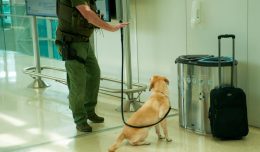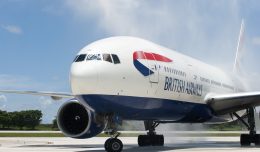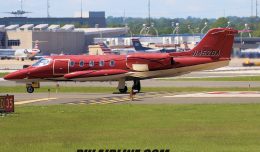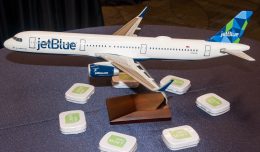When flying into most airports, there always seem to be hangars scattered around the airfield. Those hangars may have aircraft parked in front, hangar doors open, and airplanes in various stages of disassembly. Most people don’t pay a lot of attention to these small parts of the airport. However, these facilities provide vital services to the aviation community. These buildings usual belong to what is called a Fixed Base Operator or FBO in short. A Fixed Base Operator is defined as “A commercial business granted the right by an airport to operate on the airport and provide aeronautical services such a fueling, hangaring, tie-down and parking, aircraft rental, aircraft maintenance, flight instruction, etc.”
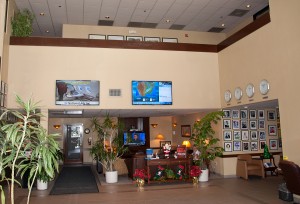 The history of fixed base operators goes back to the end of World War I when civil aviation was not regulated. Traveling pilots (often known as barnstormers) would fly from town to town and city to city. Usually they would land in local fields, as there were very few actual airports in those days. The barnstormers would offer rides for the local population, instruction to those wanting to learn to fly, or fly aerobatic demonstrations charging whatever money they could to keep themselves flying. Due to the transient nature of this early flying, early mechanics and flight instructors would move
The history of fixed base operators goes back to the end of World War I when civil aviation was not regulated. Traveling pilots (often known as barnstormers) would fly from town to town and city to city. Usually they would land in local fields, as there were very few actual airports in those days. The barnstormers would offer rides for the local population, instruction to those wanting to learn to fly, or fly aerobatic demonstrations charging whatever money they could to keep themselves flying. Due to the transient nature of this early flying, early mechanics and flight instructors would move 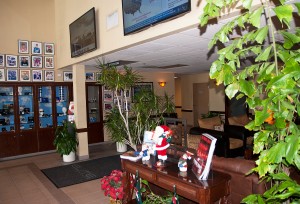 around with the aircraft.
around with the aircraft.
In 1926, the Air Commerce Act was passed by the United States government. With this came new rules such as the licensing of pilots, regulations regarding the training of those pilots, and specific requirements for aircraft maintenance. Those mechanics and pilots that previously had lived a life on the road began to establish permanent businesses, As the number of airports around the country grew, the term ‘fixed base operations’ was born. In this article we will delve into the history, operations, services, and people behind one such fixed base operator,  National Jets, which is located on the north side of Fort Lauderdale/Hollywood International Airport (FLL).
National Jets, which is located on the north side of Fort Lauderdale/Hollywood International Airport (FLL).
National Jets was founded in Durham, NC in 1945 by the three brothers of the Boy family (Carl, James and Thomas). The company initially was formed as an outgrowth of a family owned automobile service station. In 1960, the company moved to Fort Lauderdale/Hollywood International Airport. There, they began to specialize in the leasing and operation of large cargo aircraft. Over the years, those aircraft have included the Douglas DC-3 through DC-7 and the Lockheed Super Constellation, in addition to aircraft manufactured by Convair. Many of the company’s early cargo contracts involved flying oil-drilling equipment throughout South and Central America. Another early cargo contract was for a large grocery store chain that needed to fly fresh produce and refrigerated items to islands in the Caribbean. At one point, National Jets also had a fleet of 20 aircraft that were used to distribute the Wall Street Journal throughout the United States. The early 1970’s brought more advancements for National Jets. During this time, they purchased their first Learjet, and became one of the first flight schools to offer training for fighter pilots returning from the Vietnam War. National Jets was able to provide veterans with the training needed for a career flying corporate jets.
Today Thomas Boy, the only surviving brother, still serves as Chairman of the Board and as Director of the corporation. Additionally, the Boy family still privately owns the corporation and its subsidiaries. NYCAviation’s Mark Lawrence was recently privileged to be able to sit down with Russell J. Boy Jr., General Manager of National Jets, to get more insight into their operations and what it takes to run a FBO. He also got a first hand look at what the day-to-day operations are like. In future articles, he will also explore National Jets’ other businesses as an aircraft charter company and as an air ambulance provider.
ML: Can you give us a very quick description of what the National Jets FBO is?
RJB: We are a family-owned operation and offer 24 hours a day, 7 days a week, 365 days a year services providing all the traditional services to our customers including fueling, maintenance, repair, etc. We have about 80 permanent staff on site that handle all the operations of the facility and included in that count are pilots, in-house dispatchers, medical crews for our air ambulance service, etc.
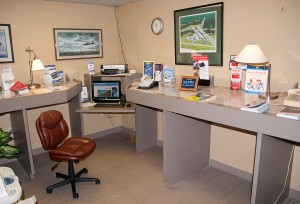
National Jets provides pilots with the facilities and support needed for planning their next flight.
ML: Which departments make up the actual running of the FBO?
RJB: Customer Service, which apart from safety, is the most important aspect of the operation. Line Service provides the aircraft marshaling (editors note: marshaling is the use of hand signals to guide aircraft), ramp parking facilities and aircraft fueling services. We have a full Concierge service and Ground Support that includes aircraft maintenance. Vendor Relations is responsible for the management of all car rentals, limousine services, hotel rooms, fuel pricing and catering services that are negotiated by us for the customers. Finally, there is the Fuel Farm Management team.
ML: What is Fuel Farm management?
RJB: National Jets has a fuel storage farm on airport premises that has a capacity of 75,000 gallons of fuel. Keeping track of that fuel, so that we can provide our customers with the fuel they require is very important. Bear in mind that a few large capacity aircraft coming to the facility can use all of our available fuel stored in the farm pretty quickly. Because of that, we have to be able to manage the capacity of the farm, and to be able to restock the farm at a moments notice.
ML: What does National Jets provide as a FBO that is different from other FBOs?
RJB: The answer to this is very simple – a personal touch. We are a family-oriented business, not a corporation. So the owners, management, and staff are always available for our customers. We want to make sure that what the customer experiences whenever they arrive at our facility is the best experience they can have and they will always want to come back to National Jets.
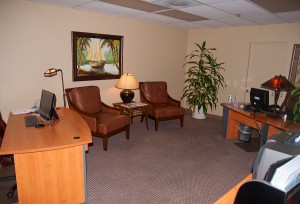 ML: Does the personal touch extend internally into the organization as well?
ML: Does the personal touch extend internally into the organization as well?
RJB: Absolutely – as much as our customers are important to us, our employees are equally as important – our employees are the face of the organization to the customers. We, as the owners and management, have always had an open door policy when it comes to our employees. We also believe that it is important to promote from within the organization. We have members of the organization that have started in entry level positions that are now well up the ranks of the organization and have been here a long time – quite a few people in the organization 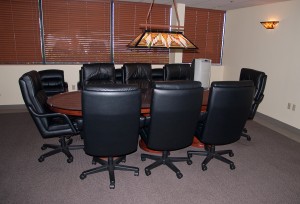 have been here 15 and 20 plus years.
have been here 15 and 20 plus years.
ML: What facilities are available for customers at the FBO?
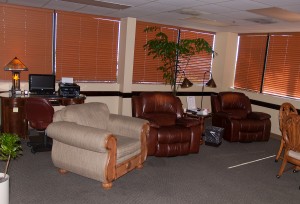
Some of National Jets’ customer-focused facilities include areas for pilots to rest while their passengers attend to business. That business can be conducted in the FBO’s own conference facilities as needed.
RJB: The FBO facility has all the requirements for our customers. We have free Wi-Fi Internet throughout the facility. There are executive conference rooms that are available on site, so should a customer need to have meetings here instead of traveling into the city or to nearby cities, they are able to do so. These conference facilities have been used by political figures, top executives from Fortune 500 companies, anyone is free to make use of them. Our vendor relations department is able to provide limousine services, car rental, hotel rooms, catering – anything that a customer might need should their plans change while they are in town.
ML: And for pilots, what facilities are available to them?
RJB: Apart from having 5 full time dispatchers in-house to assist them with flight plans, load planning, etc. The pilot lounges have everything that they need to meet their requirements – comfort and the ability to relax, access to the latest weather forecasting services – anything that will assist them in getting to their next destination as quickly and as safely as possible with all the available information.
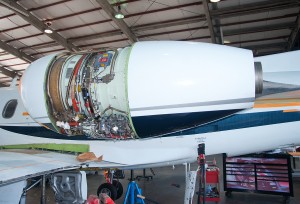 ML: Apart from the traditional FBO services, National Jets is also a FAA-approved repair station. What kind of repair services do you provide?
ML: Apart from the traditional FBO services, National Jets is also a FAA-approved repair station. What kind of repair services do you provide?
RJB: We are a fully accredited FAA Part 145 repair station with our own mechanics, inspectors, etc. on site. We can handle any type of repairs from the smallest bolt replacement to large repairs like replacing wings and spars. We deal specifically with business jets and smaller aircraft. The only thing that is not available onsite is painting.

National Jets provides repair services for both their own aircraft as well as for customers aircraft.
ML: You are located on the edge of what is a very busy airport. How do the commercial operations in any way influence your operations?
RJB: We are very lucky that we have great relations with the majority of the operators on the airport property from the Aviation Department of Broward County to the commercial airlines. There are certain times of year, such as Thanksgiving and after Christmas when the number of commercial movements on the airfield might have an impact on our own arrivals and departures, but on the whole, these delays are kept to a minimum. We have a great relationship with the airlines so that if there is any equipment or services needed by anyone, a phone call can facilitate those requirements.
ML: When it comes to ramp space, how do you manage that when there is a large influx of aircraft?
RJB: That certainly can be a challenge at times, especially when we have events like the Fort Lauderdale Boat Show that are very heavily patronized. During those times, we can have upward of 50 movements in one afternoon. We are very lucky in that we have a great relationship with FedEx who are located right next door to our facility. We are, in the case of those large events, able to move aircraft over to a part of the FedEx ramp and therefore accommodate as many customers as need to use the facility. A part of the FedEx ramp is also used when we get some of the larger aircraft that we handle come in such as the Iron Maiden Boeing 757 that was used on the world tour a few years ago, Boeing BBJs that we handle, cargo equipment that use our facilities, etc.
ML: In the past, I have occasionally noticed military aircraft on the ramp when I have driven past your facility. Do you handle military traffic as well?
RJB: Yes, we have the contract for handling military traffic that come to Fort Lauderdale. These movements can range from large transport aircraft to executive aircraft, and the aircraft can range in size from a small Beech King Air to a Boeing C-17 transport. We provide all the same facilities to the military as we would to any other normal FBO customer. We also provide services to the NOAA aircraft that operate the Hurricane Hunter flights as part of that contract. (Author note: We previously reviewed one of the Hurricane Hunter aircraft that was on the ramp at National Jets).
ML: What is a typical working day at an FBO?
RJB: If there is anything such as a typical working day, the usual workings of National Jets involve a mix of the following: We have customers that fly in and out of the facility. We will refuel their aircraft, assist with planning, catering, flight plans, weather, etc. We will assist them with any needs they require during their visit – be it a couple of hours or several days. There will be repairs going on in the hangars and on the ramp – some small, some large. Our facilities are always a hive of activity. There is one thing that is always kept in mind: things can change at the FBO very quickly. While we usually are aware of incoming and outgoing operations, things can change at a moments notice due to diversions or a customer having a change in plans. We have a radio frequency that is monitored 24 hours a day and any customer can call on that frequency and request any or all of the services that we can provide.
ML: What does the future hold for National Jets?
RJB: We would like to expand the actual size of our ramp and the hangar facilities in the future to be able to provide more parking and hangar space. We have our own fleet of Learjet 35As that are used in the air ambulance and charter service. We are phasing those out over time and replacing them with newer jets. We currently have one Learjet 45XR and will be expanding the number of that type as we phase out the Learjet 35As. We are always on the lookout to expand into other areas/markets.
ML: Thank you very much for your time and the opportunity to delve into the workings of a FBO – something we haven’t had the opportunity to do before.
Mark Lawrence, Producer, is a South Florida-based aviation fanatic that has been around the industry since he was a small boy. As well as being an avid photographer, he also runs his own blog that can be found at http://amateuravphoto.



